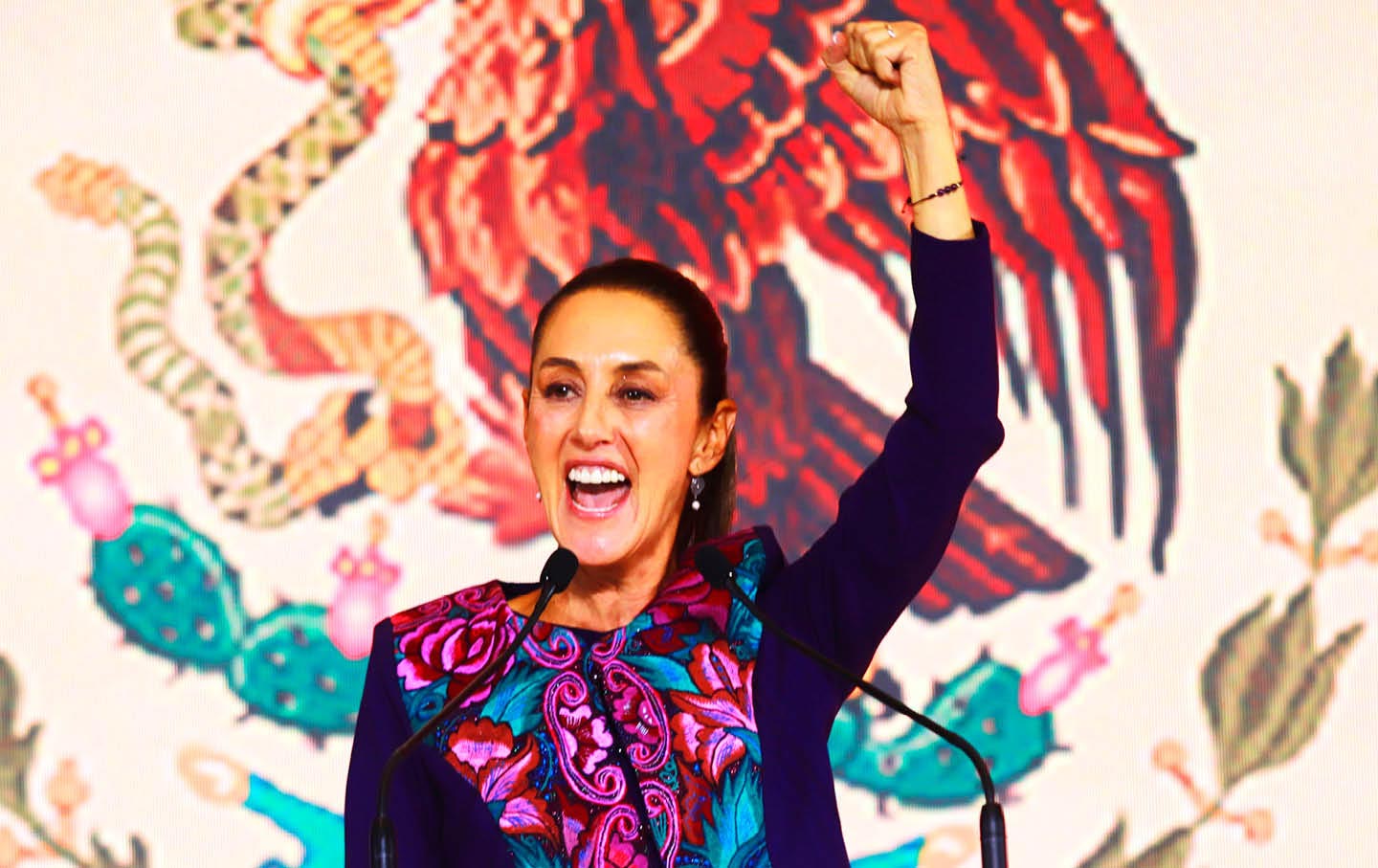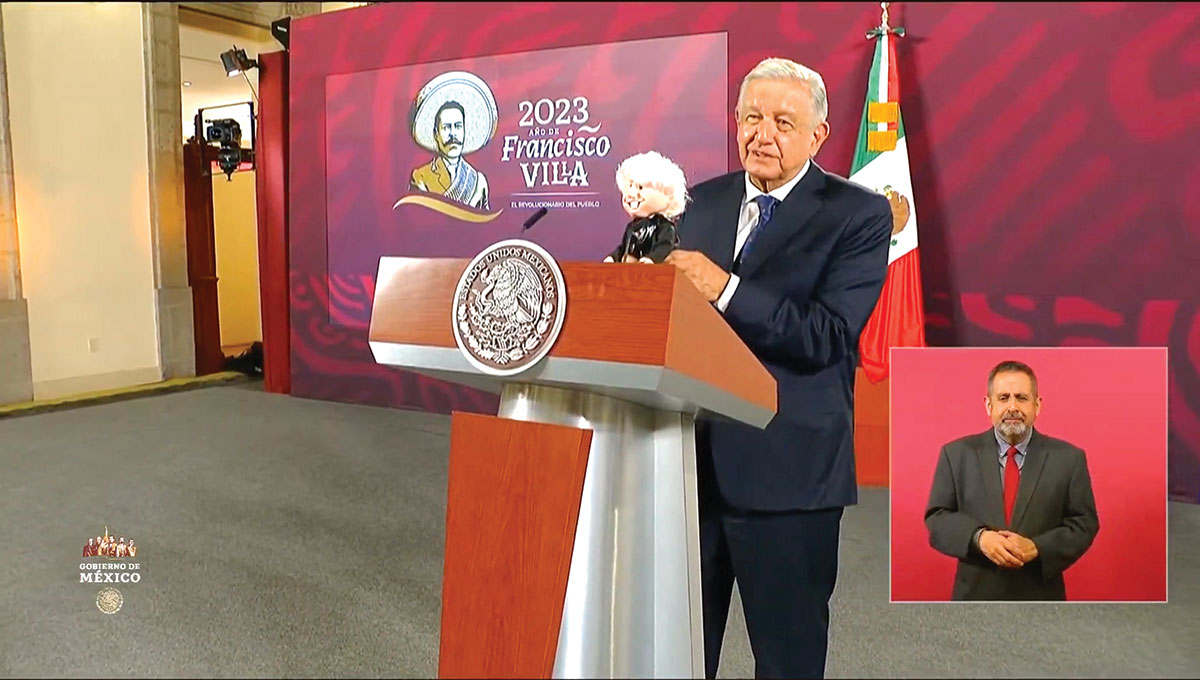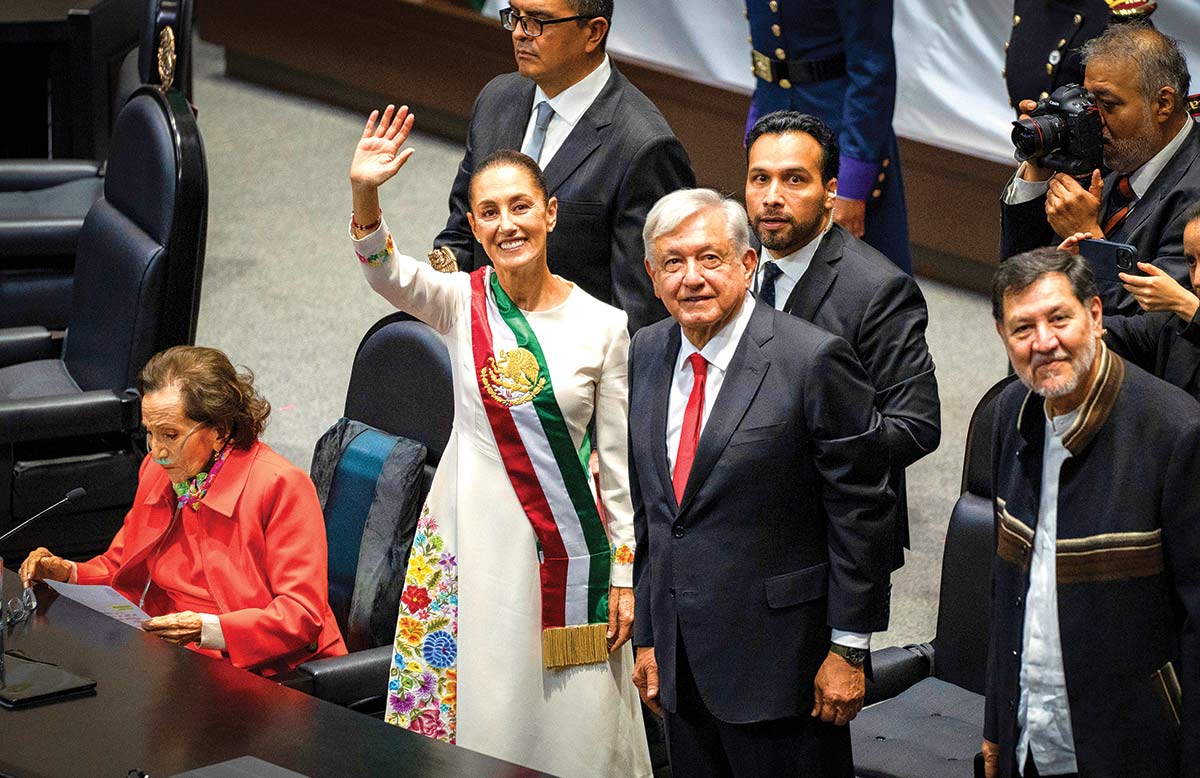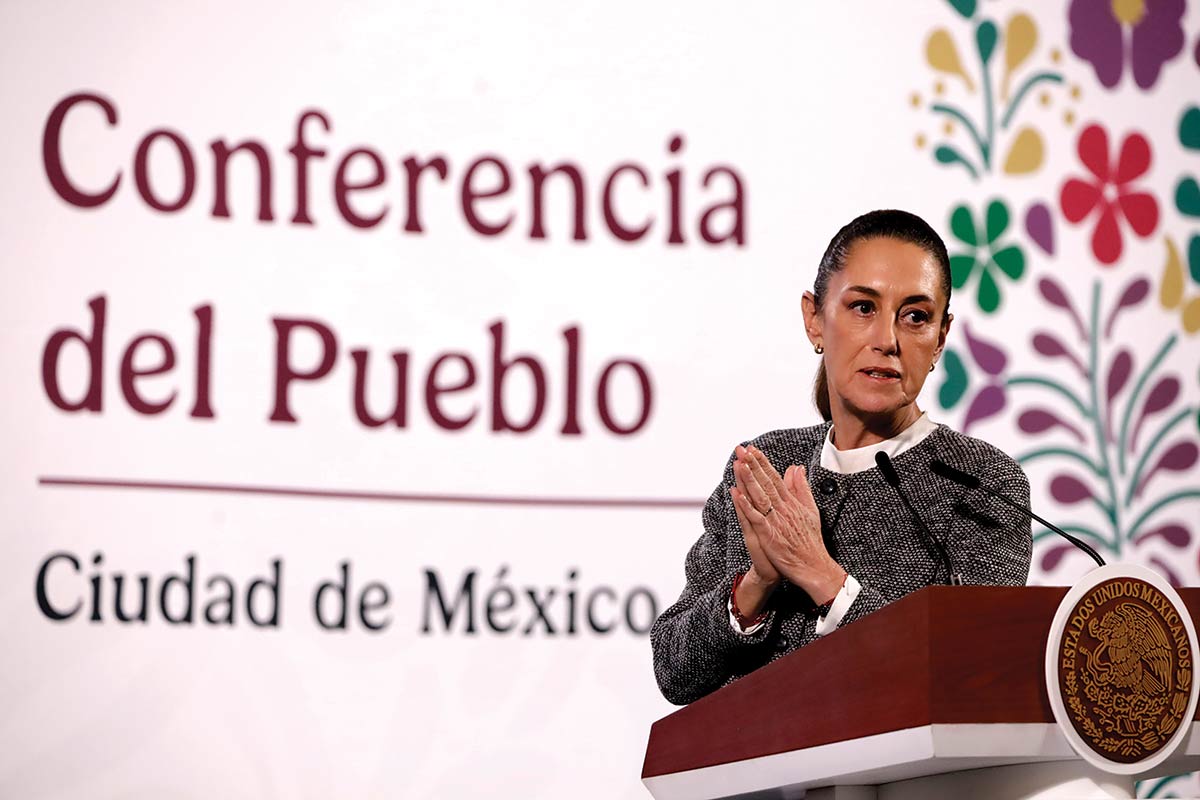Morena and Claudia Sheinbaum Have Kept Up Mexico’s Move to the Left
Incumbent parties around the world keep losing to upstart challengers. Yet Mexico’s López Obrador defied the trend, handing off his presidency to Sheinbaum. What’s their secret?

At a time when incumbent parties around the globe are losing to upstart challengers, Mexico’s left-wing Morena party stands out as an exception. Former president Andrés Manuel López Obrador’s mañaneras—daily press conferences that fused governance with storytelling—revolutionized political communication, creating a direct, unfiltered dialogue with the public. This approach has now been embraced by Mexico’s new president, Claudia Sheinbaum, as she builds on AMLO’s legacy and looks to create her own path. Nation editorial board member Waleed Shahid spoke with Ezra Alcázar, a political strategist and writer who works at Fondo de Cultura Económica, a prestigious Spanish-language publishing house (he is also the anchor of El Desfiladero on Canal Once), and Alex González Ormerod, a historian and journalist who leads The Mexico Political Economist, to explore how Morena’s communications strategy bypassed a hostile right-wing media, earned the trust of working-class Mexican voters, and cemented a populist agenda that reshaped the country’s political landscape.
Waleed Shahid: What is the purpose of the mañanera politically, and what lessons have you been able to learn from it?
Ezra Alcázar: [Former president] López Obrador began hosting the mañaneras back when he was mayor of Mexico City. Every morning, he’d have a press conference where he’d inform the public—well, the media—about what was happening in the city: which meetings had taken place, how security was progressing, and more. Journalists from various outlets would attend and write their stories.
López Obrador spent a lot of time not only answering the questions but also conceptualizing, from his point of view, what he was being asked. This ensured that he was directly telling the people how he interpreted things.
Alex González Ormerod: We’ve got to remember that the media in Mexico back then—and to some extent now—was corporate media, mostly leaning to the right, and then the government media, which today is in the hands of Morena but back then was in the hands of the right-wing former president Vicente Fox. So it was basically all opposition media. This was López Obrador’s way of fighting back.

Shahid: Can you give a little more flavor to what happened at these mañaneras? Most people in the United States don’t know anything about them. Was it a place to combat his vulnerabilities, to frame a message with an adversarial press? Or was it more to repeat every day what the main message was, of the campaign and of the presidency?
Alcázar: Before we started this interview, I watched López Obrador’s last morning press conference. He mostly spent the time thanking the journalists who covered him. It’s worth noting that in that last morning conference, the president raffled of his watch. That shows a bit of the tone of the morning conferences. They were very varied; it could range from a raffle with the journalists to playing a song or talking about books.
I remember a moment when I read a column by a journalist in Mexico saying that López Obrador didn’t read books, and that this was evident because he never cited any books. Well, I took it upon myself to review several morning conferences where he mentioned more than 100 books, and he didn’t just talk for five seconds. It wasn’t just mentioning the title, author, and summary; he would go in-depth, explain why he wanted to bring up that book, from Mexican classics [by writers] like Elena Garro or Juan Rulfo to universal classics like Tolstoy or Stefan Zweig. These helped him provide a foundation—not theoretical, but historical and moral—for what he wanted to explain.
For example, if he was discussing judicial reform, he might talk about Tolstoy and the importance of living without many luxuries, or Dostoyevsky and themes of justice, drawing from Crime and Punishment. Or if he wanted to talk about his movement and the significance of the transformations happening in the country, he might reference Stefan Zweig. We gathered over 45 minutes of him talking about books. Even if you hadn’t read those books but knew they existed, you would feel a theoretical foundation for understanding, and it gave weight to what he was saying. You felt like you were part of something important happening in your country.
I think that the tone López Obrador used—of giving historical and moral foundations to his discourse—was very important for including people. He used extremely simple language, which doesn’t make it any less valuable than any other form of language. What López Obrador did was understand the language of the Mexican people after traveling—not just traveling, but visiting and working throughout the country—and discovering the language he needed to use to communicate with the people.
González Ormerod: People made fun of him because he’s a bit of a slow talker. He justified this by saying that if he talked too fast and misspoke, it’d become international news. But even when he was being slow, he was incredibly entertaining. He was very funny—far more sophisticated than Trump, for example. He talked directly to the people in language they could understand. This is the real challenge for Claudia Sheinbaum. She’s a completely different political animal—though not less effective, I’d say. You can see it in the way she’s broadening communications in a far [more] diversified way. I’m fascinated with her TikTok channel, for example, which I think is very millennial and Gen Z.
Shahid: In the United States, liberal elite publications like The New York Times refer to the mañaneras as Trumpian, authoritarian, Hugo Chávez–style, and anti-intellectual.
González Ormerod: Ezra and I have eternal debates about this. I did feel that there were sometimes moments where he did overstep a line, like the doxing of Natalie Kitroeff, the New York Times journalist [whose phone number López Obrador disclosed]. He never attacked journalists in the way that Trump does. He never advocated for violence. He never said, “Do terrible things to them.” But I think there were moments where he perhaps slipped up. There was a lot of to-and-fro as to how justified the doxing was. As a member of the world of journalism, to me it is important that these sorts of boundaries be respected. But, of course, breaking boundaries is part of what the mañaneras are for.

Alcázar: That’s a problem with those who set the norms for how analysis is done. We label speeches that manage to connect with the masses as “populist” or “demagogic” because they don’t use overly technical or intellectual language. I think that’s a mistake, because ultimately it’s we who aren’t learning how to communicate effectively. Because, in the end, who was that criticism directed at—the people, or at the critics themselves? There’s a philosopher [David Bak Geler] who wrote a book called Ternuritas: El linchamiento lingüístico de AMLO—or Little Darlings: The Linguistic Lynching of AMLO—and it examines many intellectuals and journalists who, over the past six years, have been commenting on what López Obrador has said.
[These critics are] talking about millions and millions of people in the country… stripping these people of their capacity to be intelligent or thoughtful, as if they were being manipulated. López Obrador understood that people can’t be manipulated, but that you do have to talk to them, you have to convince them. Part of the purpose of the morning press conferences wasn’t to talk to journalists but to speak directly to the people. And I think that upset a lot of people, because it broke the tradition where, if you were a journalist or intellectual of a certain stature, you’d be invited to the presidential residence. You’d have this exclusive conversation with the president where only you would get to voice your concerns—not the concerns of the general public. The president would give you his attention, speak directly to you, and validate your importance.
I believe that the mañaneras upset intellectuals greatly because it put them on the same level as everyone else, and that’s not something they could accept. They don’t see themselves as equals to the rest of the people.
Even good-faith journalists who attended the press conferences to question the president faced challenges. Two important cases come to mind: Julio “Astillero” Hernández and Ernesto Ledesma from [the Internet TV channel] Rompeviento. They brought up significant topics and often questioned the president intensively, perhaps because he wasn’t paying attention or didn’t want to address them. They would tell him, “Mr. President, you are being lied to. Your team isn’t providing you with accurate information.”
González Ormerod: Both left-wing journalists, by the way, just for context.
Alcázar: The president didn’t directly fight with them. They just talked and talked for hours there, but there was a wave of people on social media who went after them. And that’s where, I think, the power that existed became clear, as well as how careful he himself had to be when confronting them.
Yeah, he clashed with many [of his critics] and yes, he spoke poorly of many [of them]. He often pointed out who was paying them, the relationships they had with other governments, the economic benefits they had received, and so on. But when it came to journalists he considered aggressive, and even with others, he tried to be very cautious, because perhaps they were saying important things, and he understood the power his words could have—not because the government would go after them, but because his followers would.
Shahid: There are three categories of people whom the Democrats have been losing for quite a long time: people who did not attend college or university; people who don’t pay attention to politics on a daily or weekly basis; and people who get their news from nontraditional sources like YouTube and TikTok. I’m curious how the mañaneras fit into that ecosystem.
Alcázar: I think those same categories exist here. There can be people who are very fixated and have a strong opinion about something, and others who don’t care at all—or they might say they don’t care at all, right? But I think the great success of López Obrador was bringing these conversations everywhere.
The other day, while I was at the International Book Fair in Guadalajara, I met a woman who told me, “I’m neither left nor right. I don’t get involved in those kinds of things.” But we ended up talking about politics for half an hour, even though she claimed not to take a stance.
González Ormerod: We’ve reached new heights in the politicization of the Mexican public. Most liberals think politicization is a bad thing—it equals polarization. López Obrador says the opposite. He says political communication and constant dialogue with the media and with the people is essential for people to understand what their interests are.
This takes us back to the politics of attention. His use of memes was hilarious. Obama does this, but it felt a lot more genuine when López Obrador shared his playlists. But he also politicized them: “It’s not like, ‘Oh, this is just a nice playlist.’ I’m sharing this music with you because I don’t want you listening to narcocorridos. I’m politicizing this list even when you thought it wasn’t political.” That, I think, was essential.
That takes us to Abre Más Los Ojos [an AMLO supporters’ group] and how that transitioned into the administration. This platform was really good at using memes and just sharing the zeitgeist of politics with people without forcing the politics down their throats.

Shahid: Can you talk a bit more about that and give us some more context?
Alcázar: What López Obrador always understood—that his main audience, the people he needed to speak to, wasn’t the traditional media but the public—was fundamental. The battlefield became the media, but now the media was the Internet, where conventional outlets didn’t know how to operate. And the people didn’t care whether they knew how to play the game or not—they just wanted to communicate their ideas.
This became essential. López Obrador often referred to “the blessed social media,” not because they bypassed the filter of hegemonic media, but because they passed only through the filter of the people. This later became structured into effective campaign mechanisms.
González Ormerod: On one side, you’ve got a presidential [communications] system that was based on corporate television, where they put the presidents they wanted on the stage. Enrique Peña Nieto, right before López Obrador, was arguably that sort of television president.
During that time, López Obrador went off the radar. Apart from his close followers, he was pretty irrelevant to the public conversation. He was the target of memes—the most famous one was of him sort of looking at a pigeon for some reason, and there was no context. It was like a Biden-style “This guy is going crazy—he’s old and doddery.” The sea change came with Abre Más Los Ojos.
It was led by Tatiana Clouthier, who used to be from the National Action Party (PAN), which is a right-wing party. She left PAN and joined Morena quite early on during the third AMLO campaign, which they won. And she created this apparatus filled with millennials—when millennials were still deemed to be relatively young—who were able to communicate a lot of these [messages] online. What was crucial was they did it in a way that didn’t feel party-political. It was a lot of stuff that just felt like you were being told what was going on again, like the right tends to do; they mix memes with the messaging.
Shahid: So in the United States, Republicans try to attack Democrats largely around what we call culture wars—crime, the border, immigration, abortion, transgender rights, even climate change—and the left tries to attack Republicans on issues of democracy and on being rich. There’s been a lot of discussion about how the Democrats need to focus more on economic populist issues and not get bogged down in the culture wars. Obviously, Mexican society is very different from the US, but I’m curious how both López Obrador and Sheinbaum have related to some of the issues that plague center-left parties around the world.
González Ormerod: A lot of these issues with race and gender are being resolved in Mexico as we speak through economic means. The best way to deal with issues with gender and race isn’t to say, “Let’s have a big chat”; it’s “Let’s literally just give you money.” Like, let’s just give this working woman money so she has money of her own rather than depending on the man in her family. Let’s just give these Indigenous communities money so that they can do the projects they need to do, because they know what’s best for them.
What López Obrador and Claudia Sheinbaum continue to do is to bring these issues back to economics every single time. Claudia Sheinbaum, unlike Kamala Harris, was not at all shy about saying, “I’m going to be the first woman president.” That wasn’t the issue. She said, “Because I’m a woman, I’m going to give women the economic opportunities they deserve,” and I think that was the key.
Shahid: Are the lines of political conflict in Mexico similar to those in the US?
González Ormerod: Not really. For example, López Obrador never really talked about abortion. He did a sort of states’ rights play: When it comes to abortion, Mexico’s states deal with it. Lots of very great women’s organizations are fighting the good fight on that, but I guess you’ve got to choose your battles. What unites Mexicans in general is “How are you putting food on the table?” Abortion is so important—it’s a life-or-death issue. But so is putting food on the table, and so that’s the sort of political fight you have to choose.

Shahid: One of the top issues in our election was immigration, and yet we rarely hear in American media about the Mexican side. Sheinbaum recently made her first inroads into American media vis-à-vis Trump. I’m curious how it all plays out in the Mexican landscape.
González Ormerod: The Mexican side of things is the only side of things. One of the most shocking statistics you can compare is detentions versus deportations. It’s a sort of tricky distinction, but I think it’s important. Deportation from the US means you get kicked out of the US. Detentions in Mexico mean you’re stopped and moved back to the south. They call it the carousel—they grab you in Tijuana, and they take you all the way to the south of Mexico. And that’s Mexico’s migration policy.
Biden and Trump, despite all the rhetoric, have deported far fewer people than Bush or Obama did. But Mexico has been detaining more people in recent years than ever before—it hit a record of over a million detentions in 2024. That’s far more than the low hundreds of thousands deported from the US.
When people say, “Oh, JD Vance is preparing concentration camps for the million people he wants to deport every year,” that’s the same number of detentions Mexico had in 2024. Mexico is on the roads intercepting migrants. It’s a completely different story from deportations, but we’re looking at very similar numbers, and it’s being done by Mexico violating human rights and killing people. I think that’s one of the biggest blemishes on the Mexican government at the moment. It’s arguably because they’re being forced to by the US government, but it’s pretty brutal. They’re very keen on saying, “No, we want migrants—we like migrants.” They’re not like Kamala or Trump saying, “Don’t come” or “They’re terrible people.” There’s a nice narrative around migration. But on the ground, migrants are being shot to death or being detained illegally, and that’s really worrying.
Shahid: So what’s your analysis of the US landscape, where there’s a debate about whether Harris and Biden should have been tougher on asylum seekers and migrants?
González Ormerod: We’re always trying to catch up to the right and say, “We also hate migrants, just not as much.” I think you need to really push on the fact that we love migrants. Migrants are an indicator of a country’s success. Why are we not focusing on the companies hiring undocumented migrants? We’re always criminalizing the migrants, but what happens to Texas if you take away all the migrants? The economy will collapse.
Popular
“swipe left below to view more authors”Swipe →We saw this in Georgia a few years ago and in Florida more recently. There was a mini version of the deportation strategy, and you had American farmers crying because their fruit was rotting in the fields. It’s not just these folks who are going to be sad—it’s going to be you when you look at how expensive food is. You need migrants desperately, and it’s the fact that you’ve criminalized them that makes it a bad situation. The crisis isn’t because they’re coming; the crisis is because you’ve criminalized them.
People say, “I wish there were a case study where we could look at hundreds of thousands of migrants going to one single city all of a sudden.” We’ve got that. It’s called the Mariel boatlift, where I think over 120,000 people moved from Cuba to southern Florida within six months and mostly stayed there. Miami became a powerhouse; it became one of the most important cities in America thanks to those migrants. So that, to me, is the big push we have to do from the left. You can’t do it in an election from one day to the other, but that needs to be the narrative. And in Mexico, to me, it’s not “Let’s stop the migrants.” It’s “Let’s keep all the migrants—don’t let them get to the US!”
Alcázar: There was a moment in 2020 when the feminist movement was at a very significant peak in Mexico, and [to my recollection] López Obrador was being asked to adopt inclusive language—to which he responded that it wasn’t his way of speaking.
In the end, we realized that the only way to challenge him was from the left. And that included feminist issues, trans issues, and, at times, a certain sophistication in addressing the issues of Indigenous peoples. These were really challenging.
However, I think that now Sheinbaum has incorporated all these issues into her main agenda. For example, environmental issues are so important to her, because that’s where she comes from. On the other hand, López Obrador’s phrase “First, the poor” has been transformed into “First, indigenous, Afro-Mexican, and poor women.” Once again, she addresses what was missing in López Obrador’s approach by arguing, “Yes, of course the poor come first, but we must understand that within that universe of poverty, women are a step below because they carry additional burdens.” All of this is accompanied by the idea of “All rights for all people.”
This is very difficult to reconcile within such a broad coalition, because just as there are people who support all rights for the trans community, there are also people within Morena who don’t support them. However, the message remains unified, and certain rights are pursued. I think they are making some progress there.
We must add the issue you mentioned regarding crime, where there has been a complete shift. Perhaps López Obrador’s “hugs, not bullets” approach became very problematic—not because it meant embracing drug traffickers, but because it sought to move away from direct confrontation. That was something we’d experienced under Felipe Calderón, and it was extremely violent for our country. However, the discourse must change intelligently, and we must create a way to work together with the entire state apparatus for it to function. I think progress is being made.
González Ormerod: López Obrador could spin a question about macroeconomics and talk about his grandfather, and everyone would love it. Sheinbaum tries to answer these questions in good faith, and I think she’s still missing that sort of… I don’t want to call it magic, but sometimes people try to get her on the technical side because she comes from a scientific background. I’m sure a lot of people would say it’s sexism and people demanding more of her, but I think it’s also just the fact that she tackles the questions in good faith.
Bloomberg asked her how she would deal with inflation if it goes up with the tariffs. She went off on this answer that was pretty unsatisfactory, because it made it seem like she didn’t have a plan. Mexico does have a plan. They’ve capped prices on basic goods in the market, and they’re giving out money so that people who are really poor won’t want for anything. Every single policy that Mexico has is basically an anti-inflationary policy. So she could have gone for that.

Shahid: We’ve all experienced one Trump term, and most of Mexico-US relations, at least in the first year, were about the border wall. I think this time around the focus is going to be on mass deportations and tariffs. I’m curious how you think that will impact Morena’s communications strategy and Mexican politics in general. This month is the most I’ve ever seen a Mexican president in the US news, and I don’t think it’s going to stop.
González Ormerod: One of the key things to understand is the US has the world to run in its own mind. It’s focused on every country in the world that it cares about. Mexico only really has one priority: the United States. Everyone makes it seem like Mexico is reacting to Trump. Mexico has been preparing for Trump since before he was elected, for two reasons. One, people assumed he was going to be elected. But the Democrats aren’t much better—the narrative changes, but a lot of the policy stays the same. We saw that with the children in cages. Post-Trump, the children stayed in cages—it’s just that liberal media stopped focusing as much on that.
When it comes to dealing with deportations, Mexico has an incredibly efficient network of consulates all across the US. Rural towns that have large Mexican populations have a Mexican consulate. So that’s a big safety net. And the most interesting strategy, which is a Morena policy, has been to develop certain areas and industries where we need development to happen. They call them development poles, and they have space for migrants.
I think they can do better. Private industry, NGOs, and the government need to sit down to talk about how they’re going to incorporate a lot of these migrants. Maybe lots of them want to go home, but lots of them probably want to stay, and you can incorporate them into the Mexican economy, which does actually need a lot of labor. We can make the most of this crisis. It is far more expensive for a company, and far less profitable, to have an empty space than to retrain someone and eventually, hopefully regularize them in terms of their documentation. So if Mexico can beat America to the punch, it can be a new economic boom.
Shahid: Last question. What do you think is one major lesson Democrats can learn from the experience of Morena, López Obrador, and Sheinbaum?
Alcázar: I think that phrase from López Obrador—“First, the poor”—is fundamental to understanding the need to focus on people’s most basic needs. This is crucial because, without it, people can’t stop worrying about living day to day. I mean, if I have to spend half the month figuring out how to put food on the table or pay the rent, I won’t be able to focus on the rest of my needs.
Yes, it’s important for women to have all their rights. Yes, it’s important for trans people to be understood. I won’t pay attention to environmental issues or anything else if I’m constantly trying to figure out how to make it to the end of the month. The focus this government has placed on the poorest is essential to building your project with the people. Not to winning over the media, because you’re unlikely to win there, as they have their own agenda. You have to win with the people—and ensure they are the ones countering opposing narratives. That is the great success they have achieved.
González Ormerod: Something we didn’t talk about, but which is probably the most important thing: Take to the streets. Go and speak to people where they are. That’s what most of the successful politicians have done over the past few years in Mexico. Claudia Sheinbaum’s instruction, which is a nice quip, is “Más territorio, menos escritorio.” Don’t hit the books, hit the pavement.
It’s good to get your message out, but you need to know what people actually want from you. I think Democrats are very used to lecturing people. I think Kamala Harris lost when she said, “I’m speaking.” She never stopped. She never listened. And I think that’s really important.
Disobey authoritarians, support The Nation
Over the past year you’ve read Nation writers like Elie Mystal, Kaveh Akbar, John Nichols, Joan Walsh, Bryce Covert, Dave Zirin, Jeet Heer, Michael T. Klare, Katha Pollitt, Amy Littlefield, Gregg Gonsalves, and Sasha Abramsky take on the Trump family’s corruption, set the record straight about Robert F. Kennedy Jr.’s catastrophic Make America Healthy Again movement, survey the fallout and human cost of the DOGE wrecking ball, anticipate the Supreme Court’s dangerous antidemocratic rulings, and amplify successful tactics of resistance on the streets and in Congress.
We publish these stories because when members of our communities are being abducted, household debt is climbing, and AI data centers are causing water and electricity shortages, we have a duty as journalists to do all we can to inform the public.
In 2026, our aim is to do more than ever before—but we need your support to make that happen.
Through December 31, a generous donor will match all donations up to $75,000. That means that your contribution will be doubled, dollar for dollar. If we hit the full match, we’ll be starting 2026 with $150,000 to invest in the stories that impact real people’s lives—the kinds of stories that billionaire-owned, corporate-backed outlets aren’t covering.
With your support, our team will publish major stories that the president and his allies won’t want you to read. We’ll cover the emerging military-tech industrial complex and matters of war, peace, and surveillance, as well as the affordability crisis, hunger, housing, healthcare, the environment, attacks on reproductive rights, and much more. At the same time, we’ll imagine alternatives to Trumpian rule and uplift efforts to create a better world, here and now.
While your gift has twice the impact, I’m asking you to support The Nation with a donation today. You’ll empower the journalists, editors, and fact-checkers best equipped to hold this authoritarian administration to account.
I hope you won’t miss this moment—donate to The Nation today.
Onward,
Katrina vanden Heuvel
Editor and publisher, The Nation
More from The Nation

Mahmood Mamdani’s Uganda Mahmood Mamdani’s Uganda
In his new book Slow Poison, the accomplished anthropologist revisits the Idi Amin and Yoweri Museveni years.

The US Is Looking More Like Putin’s Russia Every Day The US Is Looking More Like Putin’s Russia Every Day
We may already be on a superhighway to the sort of class- and race-stratified autocracy that it took Russia so many years to become after the Soviet Union collapsed.

Israel Wants to Destroy My Family's Way of Life. We'll Never Give In. Israel Wants to Destroy My Family's Way of Life. We'll Never Give In.
My family's olive trees have stood in Gaza for decades. Despite genocide, drought, pollution, toxic mines, uprooting, bulldozing, and burning, they're still here—and so are we.

Trump’s National Security Strategy and the Big Con Trump’s National Security Strategy and the Big Con
Sense, nonsense, and lunacy.

Does Russian Feminism Have a Future? Does Russian Feminism Have a Future?
A Russian feminist reflects on Julia Ioffe’s history of modern Russia.

Ukraine’s War on Its Unions Ukraine’s War on Its Unions
Since the start of the war, the Ukrainian government has been cracking down harder on unions and workers’ rights. But slowly, the public mood is shifting.


